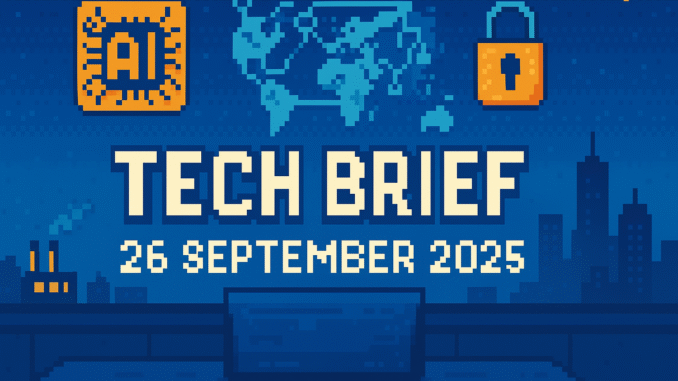
“Tech Brief 26 September 2025” delivers a direct shot of the day’s news, from North East AI spending to a supermarket cyber takedown. Regional investment, digital risks, and hardware roots rise to the surface. Tech Brief 26 September 2025 favours clear facts, real sources, and a human voice. Missed yesterday’s Tech Brief? Catch up here before diving in.
UK Government Backs North East AI Growth Zone
How often does the North East get the digital spotlight? The government’s new AI taskforce aims to boost tech jobs and infrastructure across the region, challenging London’s grip on innovation. This is not just another policy; it is a nod to local computing heritage, from Acorn dealer days to Geordie BBS meetups. Britain’s regional cities, which built their own software ecosystems long before the cloud, are now expected to power the next phase of AI development. It is practical as well as symbolic: more fibre, real jobs, local apprenticeships. For those who built networks with whatever was on hand, seeing today’s investment in the North East feels both overdue and refreshingly familiar. Success will depend on genuine engagement, not just glossy banners and marketing videos.
Co-op Reveals £206m Loss After Cyber Attack
£206 million, gone, plus customer trust and empty shelves. Co-op’s cyber breach in April hit harder than many expected, reaching deep into retail operations and supply chains. Staff faced technical outages, while customers found their personal data leaked online. It is no longer a science fiction subplot, but something that affects the places where people buy their lunch. Back in the 1990s, computer security meant a strong password and perhaps a phone lock on your modem. Now, the till in your corner shop is a front line. The sheer cost and disruption mark a shift. It is not just multinationals in the firing line; it is every retailer. How quickly can tech teams adapt? Only faster than the hackers, hopefully.
US Flags Critical Cisco Security Vulnerability
“Patch now.” That is the advice from US officials as hackers exploit a zero-day flaw in Cisco security devices. The risks are not limited to American networks. Cisco, a name familiar to anyone who ever plugged in a school lab or small business router, faces both old and new threats. These attacks target the digital plumbing that keeps everything running. Guidance to agency admins is blunt: patch quickly, monitor for unexplained outages, stay suspicious. As noted above in the Co-op story, one unpatched device can bring a supermarket chain to its knees. Security is now a job for everyone, not just the LAN admin tucked away in the server cupboard.
From the Wayback Machine
On This Day: 1960 – Fairchild commercialised Jean Hoerni’s planar silicon transistor technology with devices like the 2N1613. Hoerni’s planar process, developed between 1957 and 1959, used a protective oxide layer to boost reliability and shrink costs. This remains the unsung innovation that powered the rise of integrated circuits, paving the way for today’s processors and sensors. Every microchip still owes something to Hoerni’s factory breakthrough.
Today’s Big Question
Tech Brief 26 September 2025 brings up a question: with AI investments and security headaches both spreading far beyond London, will local tech skills and hardware know-how finally return to the top of Britain’s digital agenda? Or does everything remain permanently plugged into cloud services and old habits? No easy answers.
Dig out something you restored yourself this week, whether it is a router, a mouse, or a battered microchip, and tell our team what still works best, hands-on.
Missed yesterday’s Tech Brief? Catch up here

Leave a Reply